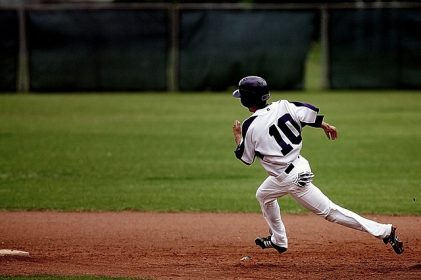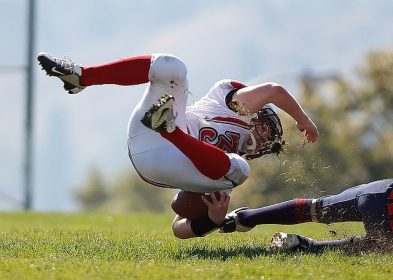Last Updated on October 12, 2025 by Michelle Ball
First, this article is not about “official” CIF (California Interscholastic Federation) sports rules. These are rules parents and student athletes need to remember when trying to comprehend CIF commissioners’ actions, understand CIF student transfer rules and processes, and navigate other CIF rules which just don’t compute.
These are MY rules based experience with CIF. Let’s call them “Michelle’s CIF Rules to keep one sane when dealing with CIF.”
CIF RULE #1: CIF IS NOT LOGICAL
I have spent the last couple decades working on resolving student matters with logical people. Most school districts and school lawyers, when faced with a student wrong or someone dissatisfied, toting their own attorney with law to back their points, are logical and willing to solve the problem. Not so with CIF.
CIF is not logical.
HOW I learned CIF Is Not Logical

I learned this when CIF stopped a student athlete from playing sports after he moved with his mentally ill recently-separated parent, due to the student’s whole family not moving.
I learned this with a sports denial, where by the time we won at the state appeal level, the player had about 2 football games left in the season he could play.
I learned this when I saw all the paperwork CIF gathered to stop a student from playing after a transfer due to bullying. Meanwhile, CIF did not speak with the student or their family about the situation, nor ask them for their support.
RULE #1 is important to remember.
I often speak with parents who have very good reasons they want to transfer a student athlete to a new school, but as these don’t fit within the rigid CIF rules, the student cannot play sports.
For example, financial hardship causes a student to have to leave their private school (second transfer)- sorry can’t play sports.
Or, a student has to live with new caregiver and move to a school where some employee from the student’s club team works- sorry can’t play sports.
Or, a student is beat up and transfers, but he did not document this with the school so cannot prove “hardship.” Sorry can’t play sports.
Or, a school checks the wrong box on the transfer form. Sorry, can’t play sports.
Or, an ex-coach lies and says the student’s family is being dishonest. Sorry can’t play sports.
Do you see what I mean?
CIF RULE #1: CIF IS NOT LOGICAL
No I did not stutter, but this is so true I wanted to repeat it. Don’t expect them to deal rationally with parents on student sports.

CIF RULE #2: CIF IS THE ULTIMATE MEAN RULE ENFORCER
CIF are true rule followers and sticklers.
Remember the hall monitor you knew, or maybe one in a movie, who would not bend on a student not having a hall pass (even though their teacher okayed it) so they got detention? This is CIF. Remember Rule #1.
CIF is the mean enforcer. If their rule says it, it is only that way. There is no other way (“This is the Way,” The Mandalorian).
If the CIF rule says that there are only 8 transfer categories that meet their hardship rules, then that is it for student athletes. One parent dying and a student having to move in with grandma? No, can’t play. That is not in the hardship rules.
They are very strict in their enforcement of the CIF rules. If it is not exactly within the CIF rule as written, the student athlete is off the team!
CIF RULE #3: CIF IS NOT ACTING IN THE BEST INTEREST OF STUDENTS
CIF, with their lack of understanding, empathy, and logic, clearly are not acting for student athletes.
When a student has to move to support a parent who separated from their mother, yet CIF says the student cannot play sports at their new school, you know what CIF cares about. Only rule #2- enforcing rules. It is black and white. There is no grey.
They are not operating in the best interests of students, at least not when it comes to their rules and reasonableness in their enforcement.
This can be further seen in the utter lack of appeal on many CIF sports matters, including hardship and sit out periods. If they cared about students, CIF would allow appeals on these issues. They don’t.
CIF RULE #4: CIF TREATS ALL PARENTS AND STUDENTS AS IF THEY ARE CHEATING
Why does CIF treat student athletes so poorly? They are treating all students based on past cheating students.
Yes, there have been students who switched schools for sports, who were wooed by coaches and moved, who lied about problems to transfer schools and to avoid CIF restrictions. Got it. But that does not mean current student athletes with CIF issues or transferring schools are doing this.

If CIF had more rules that qualified for CIF appeal, they would find out the truth: that students and families usually are not cheating.
One easy way for CIF to avoid the truth is to deny students and parents the time to explain the truth at a CIF appeal. Instead CIF presumes guilt, applies the rules harshly and unforgivingly, and denies sports to hundreds of students.
What if the student is transferring to get away from a drug crowd, or to get into an AP (Advanced Placement) class? Sorry, you can’t play- you’re probably cheating.
CIF RULE #5: CIF DOES NOT CARE
“You want to play? Who cares. We said “no” and our word is final. Suck it up son. Life is hard.”
This should be CIF’s motto.
CIF does not care. You fall outside the line, not CIF’s problem.
I have seen parents bawling at a CIF appeal about legitimate and truly difficult issues causing a transfer, and CIF continuing to have no understanding. Tough. No negotiation. No mercy.
CIF RULE #6: CIF CONFLICTS WITH ITSELF
Being such vigorous rule enforcers, one would think the CIF rules would be clear and would cover most things that happen with student athletes. Unfortunately, no.
There are areas of the school transfer process, for example, which are highly unclear and which cause real confusion. For example, the rule about student transfers and returning to the prior school to play and how long this option is available.
I often have to bring up conflicting rules when discussing CIF issues with students and parents due to CIF rule conflicts.
We are held to follow CIF rules, but if the rules conflict, this is virtually impossible. Remember Rule #1!?

CIF RULE #7: CIF OFFERS INADEQUATE PROCESSES FOR CORRECTION
CIF does not offer appeals for MANY issues, such as some student transfer issues. Although some sports issues are appealable, many are not.
For example, if a student gets no sports sit out period when they switch schools, and are banned from sports for one year, the student cannot challenge this.
This is one of the only bodies with authority over students that does not have adequate appeal processes.
What To Do About CIF?
Okay, so what to do about “Michelle’s CIF Rules to keep one sane when dealing with CIF?”
Never take any CIF student sports matter for granted.
Advocate as hard and logically as you can for the student athlete.
Never think CIF will be fair or have sympathy.
Never fail to submit lots of supportive documents with a student sports Transfer Application Form (Form 510) to support the student athlete’s right to play. Same goes for any other CIF student sports matter or appeal.
Always police the school submitting the 510 Transfer Form or other documents to CIF, to ensure the school checks the correct CIF boxes and provides CIF with all your information.
If the school does not tell the student’s story properly to CIF, or they mistakenly check the wrong box on the 510 Transfer Form (e.g. they check hardship instead of SOP- sit out period), its too late. CIF won’t let a parent go back to correct the mistake. The student is out.
Remember Rule #1.
CIF student lawyer Michelle Ball helps students and parents with CIF appeals, CIF document submissions, and many other CIF issues. As a student sports attorney in Sacramento, Michelle represents students statewide including in San Francisco, Los Angeles, San Jose, San Diego, Riverside, Irvine, Roseville, Tahoe, Redding and many other locations.
*photo credit: David Mark, Keith Johnston, Michelleraponi, Open Clipart-vectors, Keithjj

